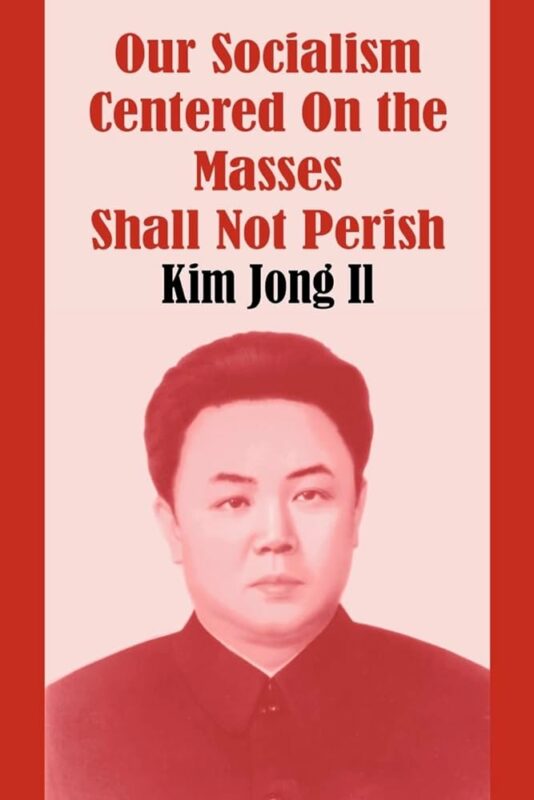Kim Jong Il was Supreme Leader of North Korea. He was also a prolific writer. Wikipedia tells us that “Kim published some 890 works during a period of his career from June 1964 to June 1994”. That sounds like a lot, though I hear most of those books were actually vampire/werewolf erotica.
This particular book is adapted from a speech the man gave in 1991, in the midst of the crash of the Soviet Union. It’s 54 pages in length, so quite a long speech—I hope nobody had to go to the bathroom. I read it to learn about the Juche school of Marxist-Leninism, and was disappointed. Kim Jong Il is not one for boring the audience with theory. His descriptions of how the Juche system works all go like this:
The Juche idea is a man-centred outlook on the world. It has clarified the essential qualities of man as a social being with independence, creativity and consciousness. It has, on this basis, evolved the new philosophical principle that man is the master of everything and decides everything.
The Juche idea has raised man’s dignity and value to the highest level.
In our socialist society, which is the application of the man-centred Juche idea, the interests of every
individual are respected.Because it is the embodiment of the Juche idea, our socialism is a man-centred socialism under which man is the master of everything and everything serves him.
Fluffy stuff. I am reminded of the time Neil deGrasse Tyson proposed a nation called “Rationalia”, with just one line in its constitution. “All policy shall be based on the weight of evidence.” It’s really easy to run a country: just make laws based on evidence. While I’m relieved that there’s such a simple road to paradise, in practice there seem to be devils lurking in the details. Likewise, a founding principle of “man is the master of everything” sounds good, but what does it mean? Is man also the master of other men? I suppose North Korea is a eighty-year experiment in answering that question with “yes”.
Hitler’s Mein Kampf isn’t my favorite book—it’s dull, and has some problematic bits (he repeatedly calls Joseph Stalin an “autistic [r-slur]”, and the chapter spent discussing his favorite anime shows is beyond the pale), but it’s big and hefty. There’s the implication of thought behind it. Even if it’s mad thought, it’s a believable and credible basis for a movement. You could use the hardback edition of Mein Kampf to club an enemy to death.
Kim Jong Il’s writing falls to the other extreme. Although light and readable, it displays no evidence of thought whatsoever. It’s just rah-rah feelgood nice stuff, emptily asserting that the Juche philosophy means certain things, regardless of how improbable or self-contradictory they might be.
Socialism is a new social system which differs fundamentally from all the exploitative societies that have existed in human history. As such, it has to blaze a trail despite fierce struggles against the class
enemies. Therefore, it may meet with transient setbacks in its progress. However, mankind’s advance along the road of socialism is a law of historical development, and no force can ever check it.
To be honest, it doesn’t “read” like something a Marxist-Leninist would write: it has the prose style of a tech CEO who hires PR firms to scrub his Wikipedia page of sexual harassment allegations. You could not beat an enemy to death with Our Socialism Centered On the Masses Shall Not Perish. Whack someone with this book and they would gain life-force somehow. Wrinkles would mysteriously disappear from around their eyes. The spring would return to their step. Only by staring at the page through a microscope can you discern any influence from, say, Hegel (note that the rise of socialism isn’t a fact contingent on particular circumstances, it’s a law. But somehow we still have to fight for it…).
The book swings like a weathervane from the banal to the palpably absurd.
The Juche idea’s approach towards people of different classes and strata is that they should be judged by
their ideas and actions
The pampered heir apparent of North Korea, gifted hundreds of totally undeserved jobs, positions, and titles by his father—could actually write (and say) this without provoking gales of laughter. Such was his power. I think I would prefer to live in a society that’s openly tyrannical and reft by classism, rather than a variant of the same that hides tyranny under classlessness. I can’t find the tweet that went something like “At least medieval peasants weren’t subjected to the humiliating fiction that their king wanted to have a beer with them.”

It appears that Juche’s main point of disagreement with mainline Marxist-Leninism is its emphasis on North Korean independence and national identity. It’s an isolationist cover of a familiar tune. The very first line of the book is “WORKING PEOPLE OF THE WHOLE WORLD, UNITE!”, but Juche socialism was not based on any sort of global class unity. So far as Kim Jong Il was concerned, the working people of the world could go pound sand, jump in the sea, and throw a flying fuck at a rolling donut. Juche was about improving the standing of North Korea. One family in North Korea in particular.
This speech was made in 1991, when North Korea was clearly rotten to the core. Half a decade later, wracked by famine and stripped of Soviet aid, it had become possibly the worst place in the world. Kim Jong-Il would later refer to these years of starvation as “arduous march”; a hiking trip to some glorious destination that some citizens (perhaps three million) were regrettably not fit enough to survive. He still found ways to enrich himself. A slogan I remember from this book is “When the Party is determined, we can do anything!” He should have said “I can do anything”.
But again, you have to give Kim Jong Il his due. This is not a book, it’s a speech, printed and sold as a book for some reason. What can you expect? And it’s not like the audience had to be convinced. They were already “pre-sold”: maybe at bayonet point, that the Juche system kicked ass. Even though there may not have been a Juche system at all, just a blank unwritten idea that allowed the Kim dynasty—Sung Il, Jong Il, and now Jong Un—to impose their real ideas on their people.
You can either read this book or avoid it. There’s not much to it, either. It’s just 54 pages, and that’s with the lines of text ludicrously double-spaced, like a padded college essay. Those empty spaces should be funny, but they’re not. I gaze into them and unpleasant images flood out. Each seems to have starved and rotting bodies inside it.
No Comments »
Comments are moderated and may take up to 24 hours to appear.
No comments yet.

